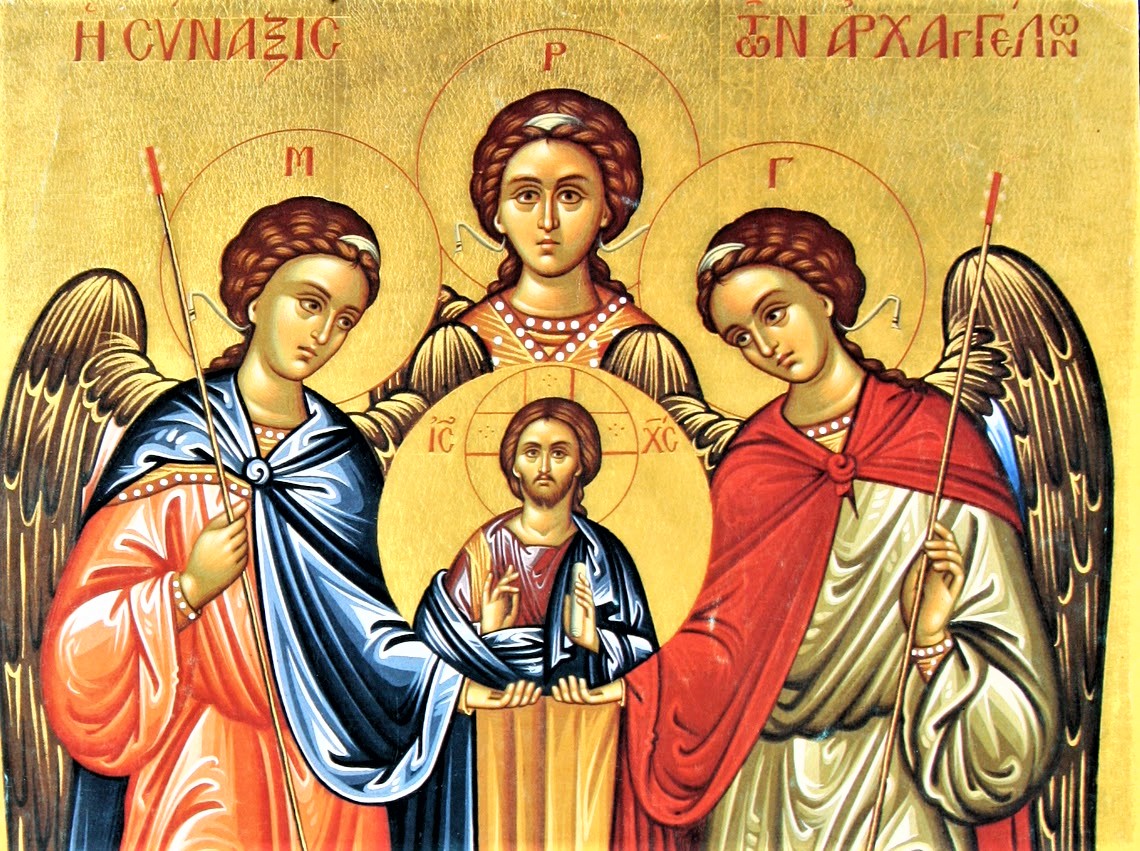The Synaxis of the Archangels Michael and Gabriel

On this occasion of the Feast of the Archangels, Angels, Cherubim, Seraphim, and all the Incorporeal Heavenly Powers, let us look at how our life is connected with the holy Angels, which includes the divine worship of our Church.
A hymn of the Church declares: “Through your Cross Christ, a flock made of angels and men, and a Church; heaven and earth rejoice” (Aenoi, Friday after Thomas Sunday). Our Christ, in His love, united us with the holy Angels through His sacrifice on the cross. We became one spiritual flock of Christ (which is His Church), consisting of humanity and the Angels. As a result, it is only natural for the holy Angels to also participate in the divine worship of our Church. The Angels praise God ceaselessly in Heaven, and also appear at every Altar (the Holy Table) of the church, where the Sacrament of the Divine Eucharist is offered, with Christ Himself present.
In fact, the Priest, during the Small Entrance of the Divine Liturgy, while holding the holy Gospel, enters the Holy Altar accompanied by the Angels. This is so that they may glorify the All-Merciful God together. And of course the Angels come and stand around the Holy Table to concelebrate with the priest, although we do not see them with the physical eye (as they are Spiritual beings). However, there have been cases where some holy priests and Bishops have claimed to see Angels around the Altar and concelebrated with them. These include St. Spyridon, St. Niphon, Bishop of Constantia (4th century), St. Seraphim of Sarov (18th century), and in our own time St. Iakovos (Tsalikis) and others.
The Divine Liturgy also incorporates the hymns of the Angels, which are mentioned in the Bible or in the Holy Tradition, such as the “Alleluia” that St. John heard the Angels sing in Heaven (Revelations 19:1) which means “Praise God,” and the “Holy, holy, holy Lord Sabaoth; the whole earth is full of His glory” (Isaiah 6:3), which the Prophet Isaiah heard the Seraphim sing around the glorious heavenly throne of God (combined with this hymn is “Hosanna in the highest. Blessed is He who comes in the name of the Lord”– this is the children’s hymn at the triumphant entry of the Lord into Jerusalem, and is sung in the middle of the Holy Anaphora in the Divine Liturgy). A similar hymn, suggested by an Angel to the Patriarch of Constantinople St. Proclus (434-446), and is also chanted in every Divine Liturgy (and often elsewhere, such as in opening prayers) is the well-known: “Holy God, Holy Mighty, Holy Immortal, have mercy on us.” We know it as the Trisagion Hymn, and it refers to the three Persons of the Holy Trinity. To these angelic hymns that are a part of the Divine Liturgy and other Holy Services, let us conclude with the hymn of the Angels in Bethlehem, where, on the night of the Nativity of the Lord they sing : “Glory to God in the highest and on earth peace, goodwill toward men” (Luke 2:14).
So in the Divine Liturgy, our own voices are united with countless angelic voices, praising the Triune God. We all celebrate together with the holy Angels! These are the powerful moments we Orthodox experience in the Divine Liturgy, and let no one doubt that. This is clearly seen from the Prayer of Anaphora, when the choir sings the Angelic hymn: “Holy, holy, holy Lord Sabaoth …” the Bishop (or Priest) continues the Prayer: “Together with these blessed powers, merciful Master, we also proclaim and say: You are holy and most holy, You and Your only begotten Son and Your Holy Spirit…” What wonderful things are happening at that time! We are one with the Angels in praising God, and at this moment, the people of God become equal with the bodiless and spiritual powers of Heaven. Along with the holy Angels gathered around the Altar of our churches, we kneel together to offer the bloodless sacrifice.
As we have these unique experiences that we live in the holy church, we exclaim: “Staying in the Temple of Your glory, in heaven we believe…” This is why the hymns of the Cherubim prepare us to imitate them in the reverence they present before God: “Let us set aside all the cares of life that we may receive the King of all, invisibly escorted by the angelic hosts.”
My brothers and sisters, in order for us to experience this reality and have it touch our souls, we must have faith, a warm love for Christ, spiritual preparation, a pure heart, and devotion to what is being done during the Divine Liturgy. This is why the Deacon (or Priest) addresses us at critical moments with directions, such as: “Wisdom, Arise”; “Let us stand well”; “Let us stand in awe”; Let us be attentive.”
Feeling that the Holy Angels are with us in the Divine Liturgy, may we be motivated by their reverence for God and participate carefully in what is happening. In doing so, we can worship our Holy Lord and God united with the Angels, and in deep gratitude, heartfelt love, and total devotion. Amen.
Source: pemptousia.com




